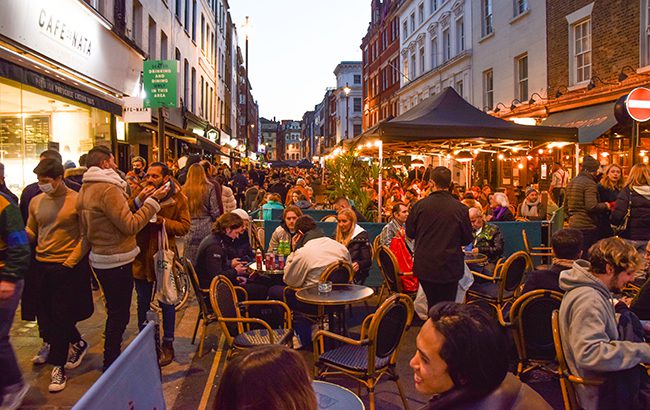UK govt to overhaul licensing rules
By Lauren BowesThe UK government is introducing new rules to fast-track licensing for on-trade businesses and protect venues from noise complaints.

The new National Licensing Policy Framework will ‘modernise outdated planning and licensing rules’, reducing the cost, effort and time it takes to open and operate hospitality venues.
It will ‘streamline and standardise’ the process for securing permissions and licences, replacing ‘patchwork’ rules created by local councils.
The government says those looking to turn empty shops into cafes, bars or music venues will face fewer forms, faster decisions, and lower costs. This is already being put in place through the High Street Rental Auction Scheme, where local councils can auction off leases for commercial properties that have been vacant for more than a year.
The framework also includes the creation of new ‘hospitality zones’. The government will fast-track permissions for alfresco dining, pubs, bars and street parties in these areas. It is as yet unclear where these will be, though it is believed local mayors and councils will select them.
Chancellor Rachel Reeves said: “Whether it’s cheering on the Lionesses or catching up with friends, our pubs and bars are at the heart of British life.
“For too long, they’ve been stifled by clunky, outdated rules. We’re binning them – to protect pavement pints, alfresco dining, and street parties – not just for the summer, but all year round.
“Through our ‘Plan for Change’, we’re backing small businesses and bringing good times back to the high street.”
The plans are subject to an initial call for evidence, which will launch in due course. However, the government said it will deliver the framework ‘as soon as possible’, as part of its commitment to reducing the administrative costs of regulation by at least 25%.
Noise complaints
The government claims the framework will also protect ‘longstanding pubs, clubs, and music venues from noise complaints by new developments. The ‘Agent of Change’ principle will make housing developers responsible for soundproofing their buildings if they are near existing venues.
Last year, Paloma Café in London’s Shoreditch closed following repeated complaints from a neighbour. At the time, its co-owner Nate Brown called for a rehaul of licensing rules, describing them as “not fit for purpose”.
The sector has welcomed the proposals. The Night Time Industries Association’s CEO, Michael Kill, described them as “a vital step toward creating a more supportive environment for independent operators, entrepreneurs, and local communities”.
He added: “The plans to streamline licensing, introduce dedicated hospitality zones, and require developers to take responsibility for soundproofing near existing venues are particularly encouraging. These are all practical measures that reflect a growing recognition of the cultural and economic value of nightlife in the UK.”
While welcoming the proposals themselves, UKHospitality’s Kate Nicholls added that on-trade businesses need further support. She said: “Positive and encouraging as these measures certainly are, they can’t on their own offset the immediate and mounting cost pressures facing hospitality businesses that threaten to tax out of existence the businesses and jobs that today’s announcement seeks to support.
“Let’s hope that this is just the start of a bold, long-term plan for the high streets and hospitality, with reforms implemented swiftly and the promise of permanent lower business rates delivered in full at the next budget to secure these new opportunities for all.”
Last week, it was revealed that public sector borrowing had risen, leading the on-trade to expect increased taxes at the next budget.
Related news
Welsh Budget ‘disastrous’ for on-trade
